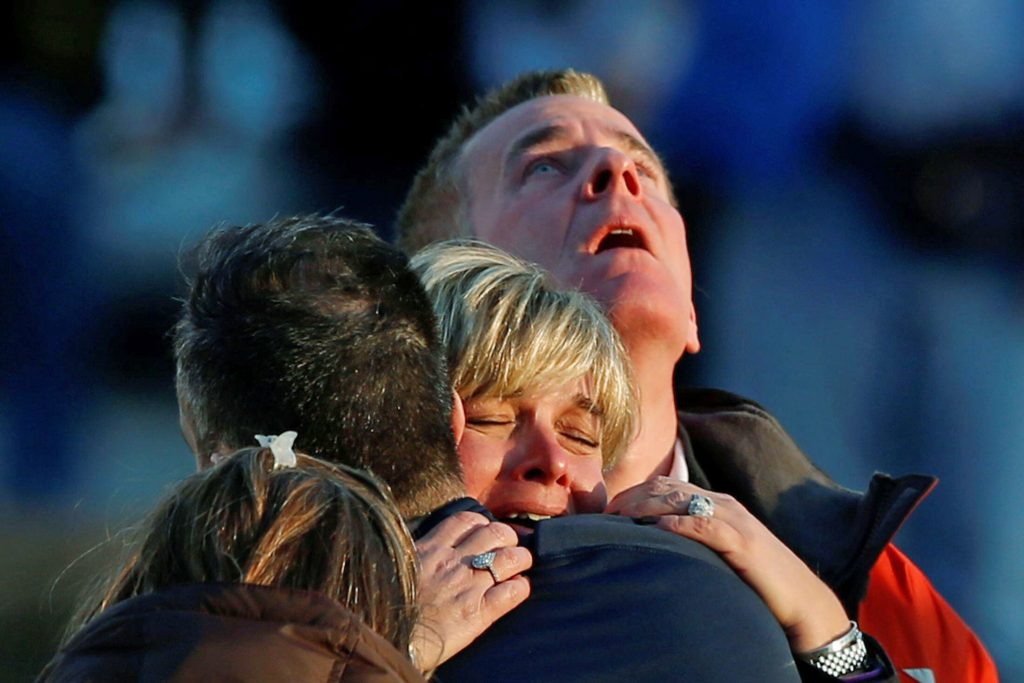
To listen to this reflection as a podcast, click here.
Throughout the month of August, we’re looking at Ecclesiastes, that strange and seemingly “modern” Old Testament book that depicts what happens when humanity searches for ultimate meaning apart from God.
As 2012 drew to a close, the Associated Press had already chosen its Story of the Year: the re-election of Barack Obama.
Then on December 14 a young man forced his way into the Sandy Hook Elementary School in Newtown CN and began shooting. Before he took his own life he had murdered 20 children, ages six and seven, and six educators.
For the first time ever, the AP re-voted. The most heart-wrenching story of the year became the most important. A week and a half before Christmas, the nation was stunned into anguished reflection.
How could such a thing happen? What’s wrong with this world? Why didn’t God intervene?
One celebrity Christian pastor proclaimed that God “chose not to stop the slaughter of these innocents” because “we are keeping God out of schools.”
That was not helpful.
The late Fred Rogers, of Mister Rogers’ Neighborhood, always remembered something his mother had told him: “Look for the helpers, Fred. Whenever something terrible happens, there are always people who hurry to help.”
Newtown was deluged by the nation’s compassion. Each bereaved family received thousands of personal notes, countless meals, and mountains of Christmas presents.
Well-meaning people sent more than 60,000 stuffed animals to the school. Most of them were re-routed to children in homeless shelters.
As Philip Yancey documents in his book The Question That Never Goes Away, some who “hurried to help” found unique ways to stand with the Sandy Hook families:
“A renowned potter from California began work on memorial vases commemorating each child who died. A quilter in Maryland volunteered to make twenty memorial quilts incorporating photos and mementoes of the children. Portrait artists got together to commission a portrait of each victim.”
Schoolchildren from around the world responded to a request to make paper snowflakes to decorate the new school that Sandy Hook students would attend later that winter. Millions of snowflakes were delivered from every U.S. state and 50 other countries.
“I feel like crying,” said one surviving child from Sandy Hook, taking in the snowflakes. “It’s children, just like us.”
The underlying message from all these gifts? You are not alone.
Within days of the tragedy, Yancey – who has long been associated with his book Where is God When it Hurts? – was invited to visit Newtown. He spent time with shattered families and talked to those in the community.
He cited Richard Dawkins, the British biologist who dismisses religion as “a virus of the mind” and asserts that the universe has “precisely the properties we should expect if there is, at bottom, no design, no purpose, no evil and no good, nothing but blind, pitiless indifference.”
When Yancey stood before a community gathering he asked, “Is that what you’ve experienced?”
He then quietly answered his own question: “I don’t think so. I have seen an outpouring of grief, compassion, and generosity – not blind, pitiless indifference. I’ve seen acts of selflessness, not selfishness: in the school staff who sacrificed their lives to save children, in the sympathetic response of a community and a nation. I’ve seen demonstrated a deep belief that the people who died mattered.”
The same outpouring of compassion is happening even now as the world grieves last weekend’s catastrophic wildfires in Lahaina, Maui. Survivors are finding support in each other’s arms, and in the efforts of those who have “hurried to help.”
The author of Ecclesiastes has much to say about the dreadfulness of going through life’s toughest moments alone:
“Two are better than one, because they have a good return for their labor: If either of them falls down, one can help the other up. But pity anyone who falls and has no one to help them up. Also, if two lie down together, they will keep warm. But how can one keep warm alone? Though one may be overpowered, two can defend themselves. A cord of three strands is not quickly broken” (4:9-13).
It’s not a surprise that this text has been featured at countless wedding ceremonies.
Notice the interplay of two and one, one and two. Then suddenly, at the end, comes the number three. Anyone who has braided hair or woven a rope knows that it’s impossible for two strands to stay together unless a third strand is interwoven with them.
What is that third strand? Jesus assures us that “where two or three are gathered in my name, there am I, with them” (Matthew 18:20). Every time we choose to come alongside someone, they are no longer alone. And even as we make that choice, we ourselves are not alone. God is always present, too.
A few years ago a university recruited volunteers to see how long they could keep their feet immersed in freezing cold water.
Their surprising discovery is that when a caring friend was allowed to be in the same room, volunteers could handle approximately twice as much pain and discomfort.
All of us suffer – some of us grievously. But none of us are called to suffer alone.
Where is God when it hurts?
Perhaps his greatest gift to us in the midst of pain is the gift of each other.
